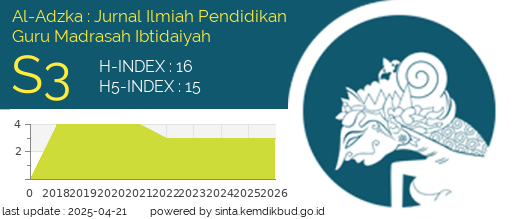Silent Struggles of Foreign Fourth-Grade Primary School Students: Psychological Resilience and Invisible Traumas in Türkiye
DOI:
https://doi.org/10.18592/aladzkapgmi.v15i2.17727Keywords:
Psychological Resilience, Invisible Trauma, Foreign Students, Migration, Educational Inclusion, Türkiye, Trauma-Informed EducationAbstract
This study investigates the psychological resilience and invisible traumas of foreign fourth-grade primary school students in Türkiye, focusing on 91 students from Syrian, Iraqi, and Somali backgrounds in a public school in Konya. Using a qualitative research design, data were gathered through semi-structured interviews exploring students' migration histories, emotional struggles, school adaptation, and coping strategies. Findings reveal deep psychological distress linked to war, displacement, and migration-related adversities. Students frequently reported fear, social exclusion, and language difficulties, which hindered academic performance and integration. Despite these challenges, many displayed resilience through religious practices, creativity, and strong family ties. Peer interactions emerged as both supportive and discriminatory. While some teachers and peers contributed positively, trauma-informed approaches were largely absent. Guided by Bronfenbrenner's ecological systems theory and intersectionality, the study emphasizes the urgent need for comprehensive educational policies that include psychological support services, inclusive pedagogies, and robust language assistance. By highlighting these students' often-overlooked emotional experiences, the research contributes to the broader discourse on migration and education, offering practical recommendations for promoting equity and well-being in Turkish primary schools.References
Arslan, Ü., & Ergül, M. (2020). Mülteci öğrencilerin eğitimlerinde yaşadıkları sorunlar: Öğretmenlerin perspektifinden bir delphi çalışması. Pamukkale Üniversitesi Eğitim Fakültesi Dergisi, 48, 309-325. https://doi.org/10.9779/pauefd.820780
Betancourt, T. S., Newnham, E. A., Layne, C. M., Kim, S., Steinberg, A. M., Ellis, H., & Birman, D. (2012). Trauma history and psychopathology in war-affected refugee children referred for trauma-related mental health services in the United States. Journal of Traumatic Stress, 25(6), 682–690. https://doi.org/10.1002/jts.21749
Birman, D., & Tran, N. (2008). Psychological distress and adjustment of Vietnamese refugees in the United States: Association with pre‐and postmigration factors. American journal of Orthopsychiatry, 78(1), 109-120. https://doi.org/10.1037/0002-9432.78.1.109
Block, K., Cross, S., Riggs, E., & Gibbs, L. (2014). Supporting schools to create an inclusive environment for refugee students. International Journal of Inclusive Education, 18(12), 1337–1355. https://doi.org/10.1080/13603116.2014.899636
Braun, V., & Clarke, V. (2006). Using thematic analysis in psychology. Qualitative Research in Psychology, 3(2), 77–101. https://doi.org/10.1191/1478088706qp063oa
Bronfenbrenner, U. (1979). The ecology of human development: Experiments by nature and design. Harvard University Press.
Coşkun, İ., & Emin, M. N. (2016). A road map for the education of Syrians in Turkey: Opportunities and challenges. Seta.
Crenshaw, K. (1991). Mapping the margins: Intersectionality, identity politics, and violence against women of color. Stanford Law Review, 43(6), 1241–1299. https://doi.org/10.2307/1229039
Emin, M. N. (2016). Türkiye'deki Suriyeli öğrencilerin eğitimi: Temel eğitim politikaları. SETA Yayınları.
Fazel, M., Reed, R. V., Panter-Brick, C., & Stein, A. (2012). Mental health of displaced and refugee children resettled in high-income countries: Risk and protective factors. The Lancet, 379(9812), 266–282. https://doi.org/10.1016/S0140-6736(11)60051-2
Kirmayer, L. J., Narasiah, L., Munoz, M., Rashid, M., Ryder, A. G., Guzder, J., Hassan, G., Rousseau, C., & Pottie, K. (2011). Common mental health problems in immigrants and refugees: General approach in primary care. Canadian Medical Association Journal, 183(12), E959–E967. https://doi.org/10.1503/cmaj.090292
Killen, M., Mulvey, K. L., & Hitti, A. (2013). Social exclusion in childhood: A developmental intergroup perspective. Child Development, 84(3), 772–790. https://doi.org/10.1111/cdev.12012
Masten, A. S. (2014). Ordinary magic: Resilience in development. Guilford Publications.
Ministry of National Education. (2023). Göç ve Eğitim: Türkiye'deki Mülteci ve Göçmen Öğrencilerin Eğitimi Raporu. Ankara: MEB Yayınları.
Motti-Stefanidi, F., & Masten, A. S. (2013). School success and school engagement of immigrant children and adolescents. European Psychologist, 18(2), 126-135. https://doi.org/10.1027/1016-9040/a000139
Panter-Brick, C., & Leckman, J. F. (2013). Editorial commentary: Resilience in child development—Interconnected pathways to wellbeing. Journal of Child Psychology and Psychiatry, 54(4), 333–336. https://doi.org/10.1111/jcpp.12057
Qian, X. (2024). Revolutionized life: long-term effects of childhood exposure to persecution on human capital and marital sorting. Journal of Population Economics, 37(1), 34.
Rubin, K. H., Bukowski, W. M., & Bowker, J. C. (2015). Children in peer groups. In R. M. Lerner (Ed.), Handbook of child psychology and developmental science (7th ed., Vol. 4, pp. 175–222). Wiley. ISBN: 9781118136799
Sarıer, Y. (2020). Türkiye’de mülteci öğrencilerin eğitimi üzerine bir meta-sentez çalışması: Sorunlar ve çözüm önerileri. Journal of New Approaches in Education, 3(1), 80–111.
Sirin, S. R., & Rogers-Sirin, L. (2015). The educational and mental health needs of Syrian refugee children. Washington, DC: Migration Policy Institute. https://www.migrationpolicy.org/research/educational-and-mental-health-needs-syrian-refugee-children
Suárez-Orozco, C., Pimentel, A., & Martin, M. (2009). The significance of relationships: Academic engagement and achievement among newcomer immigrant youth. Teachers College Record, 111(3), 712–749. https://doi.org/10.1177/016146810911100308
Tajfel, H., & Turner, J. C. (2004). The social identity theory of intergroup behavior. In Political psychology (pp. 276-293). Psychology Press.
Ungar, M. (2011). The social ecology of resilience: Addressing contextual and cultural ambiguity of a nascent construct. American Journal of Orthopsychiatry, 81(1), 1–17. https://doi.org/10.1111/j.1939-0025.2010.01067.x
Ungar, M. (2020). Working with children and youth with complex needs: 20 skills to build resilience. Routledge. https://doi.org/10.4324/9780429341953
Walsh, F. (2016). Family resilience: A developmental systems framework. European Journal of Developmental Psychology, 13(3), 313–324. https://doi.org/10.1080/17405629.2016.1154035
Wentzel, K. R., Barry, C. M., & Caldwell, K. A. (2012). Friendships in middle school: Influences on motivation and school adjustment. Journal of Educational Psychology, 96(2), 195–203. https://doi.org/10.1037/0022-0663.96.2.195
Downloads
Published
How to Cite
Issue
Section
License
Copyright (c) 2025 ETHEM GURHAN

This work is licensed under a Creative Commons Attribution 4.0 International License.
Authors who publish with this journal agree to the following terms:
- Authors retain copyright and grant the journal right of first publication with the work simultaneously licensed under a Creative Commons Attribution 4.0 International that allows others to share the work with an acknowledgement of the work's authorship and initial publication in this journal.
- Authors are able to enter into separate, additional contractual arrangements for the non-exclusive distribution of the journal's published version of the work (e.g., post it to an institutional repository or publish it in a book), with an acknowledgement of its initial publication in this journal.
- Authors are permitted and encouraged to post their work online (e.g., in institutional repositories or on their website) prior to and during the submission process, as it can lead to productive exchanges, as well as earlier and greater citation of published work.












